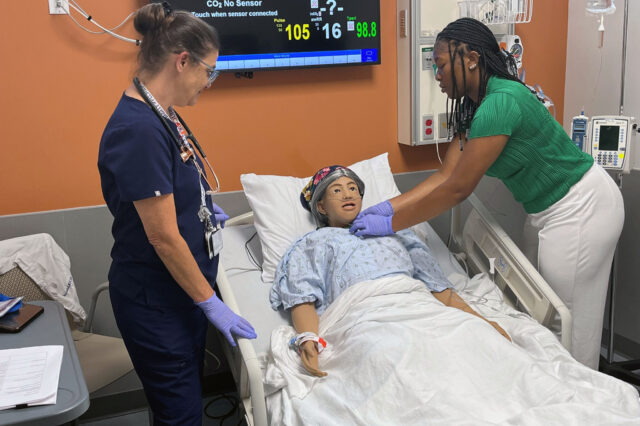UF study shows Summer Health Professions Education Program a significant student motivator

A student works on a patient mannequin at the UF College of Nursing as part of the 2023 UF Summer Health Professions Education Program. The program gives undergraduate students interested in health professions a chance to explore those careers and receive academic and mentoring enrichment.
Alessio Barca felt like an imposter as a freshman at the University of Florida.
After emigrating from Paraguay at 11 and being the first in his family to attend college, he was unsure how to navigate his new surroundings, let alone pursue his dream of becoming a doctor.
Then he attended the UF Summer Health Professions Education Program, or SHPEP, in 2020, and his outlook changed dramatically.
“When you start your undergraduate career, it can be a very intimidating experience because you don’t see a lot of people like you,” said Barca, who graduated from UF in 2022. “Participating in SHPEP is that catalyst to make you feel like you belong here. It definitely served as a motivator.”
Barca’s experience was borne out in a recent University of Florida study that showed SHPEP significantly helps break down perceived barriers among participating students. While the program dates back to 1989, the UF study was the first to study how participating students perceive its impact. SHPEP, funded by the Robert Wood Johnson Foundation, is geared toward first-generation students and students with backgrounds that are underrepresented in the sciences. The six-week summer enrichment program is open to freshmen and sophomores interested in health careers.
“This program has been around for quite some time. However, we did not have much evidence as to outcomes. Now we can show, in a scientific way, that this program is successful,” said Jeanne-Marie Stacciarini, UF College of Nursing associate dean for Community Engagement and Global Affairs.
The study, published Friday in JAMA Network Open, analyzed anonymous surveys completed by students attending SHPEP at UF from 2017 to 2021. Participants reported a significant increase in perceived motivation after attending the program. Conversely, there was a significant decrease in the perceived barriers to pursuing a health profession.
Stacciarini, the senior author of the article, hopes the study shows how enrichment programs like SHPEP are extremely supportive to underserved groups as they build a foundation for future success.
“This article is important for us, as it shows positive outcomes from programs like SHPEP; it generates evidence for other schools to model,” she said.
The article is a collaborative effort from faculty, administrators and researchers from the UF Academic Health Center, who are involved with the SHPEP program.
“This study shows that students benefit. They come in with perceived barriers to their academic and professional success, and as they go through the program they discover ways to overcome the barriers, especially those that come due to fixed mindsets,” said study collaborator Patricia Xirau-Probert, UF College of Dentistry associate dean for Student Advocacy and Inclusion.
While 12 universities across the country offer the program, UF Health, the university’s academic health center, is the only one in the Southeast offering exposure to six health-related colleges on a single, contiguous campus.
At UF, SHPEP students get exposure to all six colleges, including Dentistry, Medicine, Nursing, Pharmacy, Public Health and Health Professions, and Veterinary Medicine. Students can choose between four pathways to gain deeper hands-on experiences in their main field of interest.
Additionally, students also receive academic enrichment in basic science, and training to develop study, test-taking skills, interview, resume writing, professional etiquette and other development skills.
“One of the things we also value is the mentoring aspect. All the students are matched with other professional students in their field of interest,” Stacciarini said. “There is also a wellness initiative. We teach self-care strategies. We practice mindfulness and meditation.”
Xirau-Probert said she thinks programs like SHPEP can prove transformational.
“I have seen undergraduates who don’t have access quickly get overwhelmed and give up on their professional dream,” she said. “A program like this gives you tools and resources that help participants reach their goals.”
For Barca, the program helped him build a network of people he met during the program, including fellow participants, faculty, staff and professional students, whom he reaches out to for advice or encouragement. Since graduation, he has served as an ambassador for the national organization, driving others to participate in the program.
“It helped me tremendously. For almost everyone that participated, it was a very empowering experience,” said Barca, who hopes to start medical school in 2025.
SHPEP originated in 1989 when the Robert Wood Johnson Foundation established the Minority Medical Education Program, which focused on increasing minority acceptance at medical schools through an intensive academic preparation program. In 2003, the program expanded to include students from diverse economic and cultural backgrounds. In 2006, the program added dentistry, and in 2016, it became SHPEP, adding nursing, pharmacy and public health.
The program is free. Included are housing, food, travel assistance and a stipend. At UF, the first two weeks of coursework are online. The final four are on campus in Gainesville.
Xirau-Probert said SHPEP's impact can be profound.
“There are students with the vision of who they want to be and have the skills, but don’t necessarily know how to put them into play,” Xirau-Probert said. “SHPEP guides them and helps them achieve their potential.”
In addition to Stacciarini and Xirau-Probert, the UF study team included Tram Lai, BS, College of Dentistry research coordinator; Erik Black, Ph.D., College of Nursing associate dean of student affairs; Dany Fanfan, Ph.D., College of Nursing assistant professor; Amy Blue, Ph.D., UF Office of Interprofessional Education assistant vice president; Caronne C. Rush, MSM, Office of Interprofessional Education assistant director; and Rachel Powers, College of Dentistry education and training specialist.